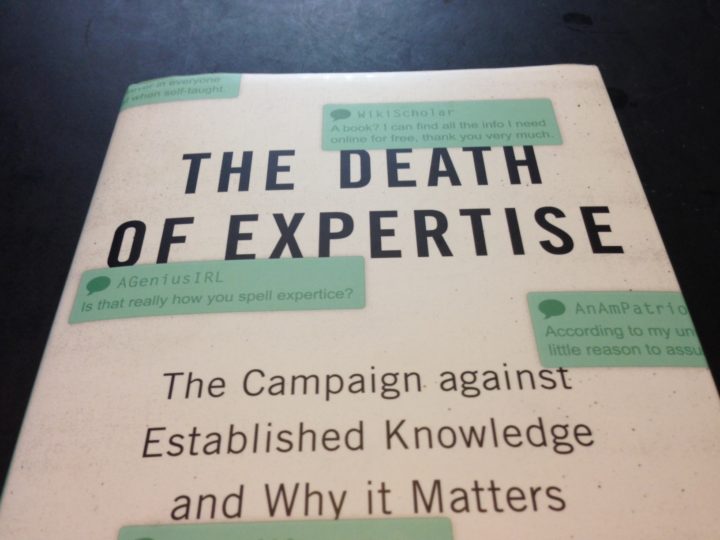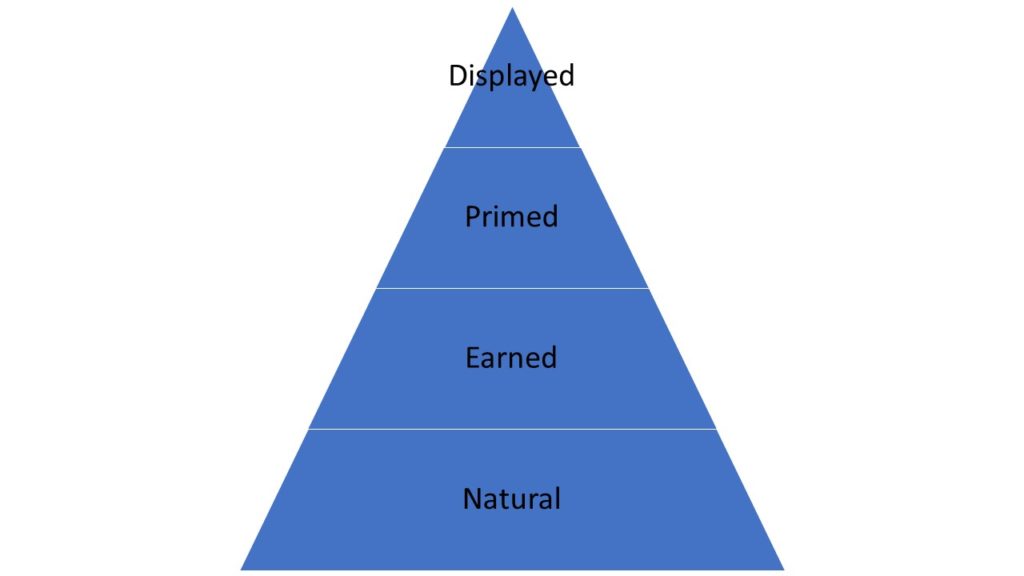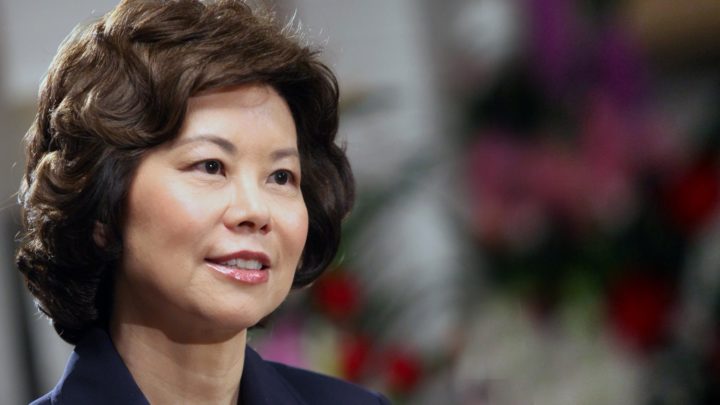I’ve just finished reading The Death of Expertise: The Campaign Against Established Knowledge and Why it Matters, by Tom Nichols. Nichols is a Professor of National Security Affairs at the Naval War College, and he is deeply concerned about the dumbing-down of our national discourse, in which the loudest and most simplistic opinions seem to carry far more weight than the carefully nuanced opinions of experts.
As a nation of rugged individualists who believe we’re all created equal, we Americans have always had a healthy skepticism about experts, which was noted as early as 1835 by Alexis de Toqueville almost 200 years ago. I remember one of my high school teachers defining an expert as “someone who learns more and more about less and less, until finally he knows everything about nothing.”
And there have been good reasons for that skepticism. First, expert mistakes have certainly cost us, with Exhibit 1 being the foreign policy elites who have gotten us into trouble from Vietnam to Iraq and many places in between. It’s also hard to trust experts when finding experts who contradict each other is as easy as switching channels, and experts who sell their opinion to the highest bidder or overstep their knowledge to gain attention unfortunately get more attention than those who are more cautious.
But focusing on the mistakes (or other shortcomings) of experts ignores their far more important contributions to our lives. The experts who got it wrong with the Challenger also got us to the moon; the chemists who gave us thalidomide also have saved or improved millions of lives with other drugs; and to give the foreign policy establishment their due, they also helped build the postwar world order that has prevented a war between major powers for over 70 years and has contributed to an unprecedented expansion of prosperity.
When you ignore the contributions of experts and focus only on their failings, you stand to lose far more than you gain, like burning down your house to kill the mouse you saw in your kitchen. So it’s smart to take a careful and informed approach to assessing expert advice. As the saying goes, “if you think an expert is expensive, try hiring an amateur.”
But that’s exactly the problem we’re running into today—we’re paying far more attention to the loud and simplistic amateurs than we should. The backlash against established expertise the problem we’re running into is turning (or already has, most likely) healthy skepticism not only into unhealthy skepticism and cynicism but into aggressive and willful ignorance. We value confidence far more than credentials, which is why we elected a man who says he is the only one who can fix things.
The Internet was supposed to lift us all up, by putting the accumulated knowledge of the world at our fingertips. Instead, according to Nichols it has made us dumber, and I agree with him. Because anyone with a connection can create a slick website and reach the whole world with their opinions, the overwhelming quantity of crap tends to bury the quality. Sturgeon’s Law, which says 90% of everything is crap, is woefully deficient in describing the internet. For most people using it to do “research”, the internet is simply a powerful engine for confirmation bias. As if that’s not enough, Nichols also describes the impact of a higher education system that has misguidedly turned students into “customers”, and the proliferation of talk radio and cable TV stations that cater to every conceivable taste and perspective, so that no one ever has to run the risk of running into an uncomfortable fact.
After I put down the book, I jotted down some notes to try to answer the title question of this blog. (Since I’ve covered some aspects of this problem previously in my blog, what follows combines some of the ideas from The Death of Expertise and some of my previous thinking, and it’s impossible to separate the two. As a rule of thumb, if it sounds smart, credit Nichols.)
What do the experts owe us?
- Don’t overstate your case. Nichols is slightly guilty of this, starting with his title. Death is a pretty strong word, and the word campaign carries a slight whiff of conspiracy theory to it. It’s definitely a trend that many have exploited, but no one is guiding it.
- Stick to what you know. Linus Pauling deservedly won two Nobel prizes, but tarnished his reputation when he touted Vitamin C as a panacea (not to mention dabbling in eugenics).
- Be a foxy hedgehog. From a strong base of expert knowledge, become curious about the rest of the world and get comfortable with uncertainty and disagreement.
- Separate fact from opinions. Be clear in your own mind first, and then explicit about the difference in your public statements.
- Separate analysis from predictions. As Philip Tetlock has shown us, the average expert is just slightly more accurate than a drunk monkey throwing darts when it comes to making predictions.
- Be professional. Professionalism includes the above admonitions plus an obligation to the greater good—of your clients and even sometimes the general public.
What do we owe the experts?
- Look for signs that the expert you’re reading is following the rules above.
- Recognize that when it comes to expertise we are not all created equal. Don’t think that a half hour spent perusing Google returns gives you the right to argue with someone who has devoted their professional life to the topic.
- If you still feel the need to argue with experts (for example, I take issue with some of the ideas that our City’s traffic experts are trying to sell to the public), at least make a serious effort to learn the fundamentals of the topic first.
- Be careful what you put in your mind. If it’s true that you are what you eat, it’s even more true that you are what you read.
- Become a more critical thinker and learn how to identify quality. Here’s a few recommendations for further reading that will better equip you for the task:
o When Can You Trust the Experts? by Daniel Willingham
o Superforecasting, or Expert Political Judgment by Philip Tetlock
o For detecting business and management BS: The Halo Effect…and Eight Other Business Delusions that Deceive Managers, by Phil Rosenzweig, and Leadership BS by Jeffrey Pfeffer
o Thinking, Fast and Slow, by Daniel Kahneman.
o Curious, by Ian Leslie.
I heartily recommend this book, but the irony of a book about the death of expertise is that those who most need to read it are the least likely to.







